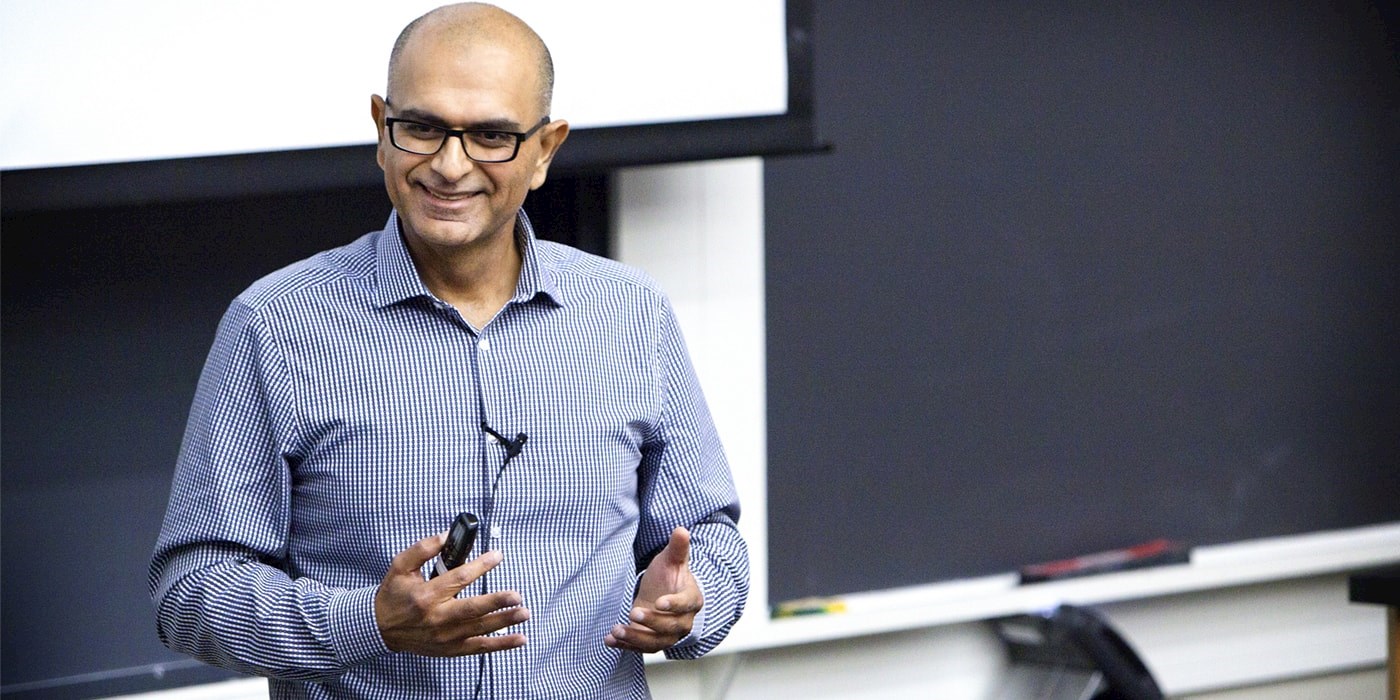In hindsight, Deepak Ahuja is glad that he didn’t know what it meant to run a startup when he became the chief financial officer of Tesla Motors in 2008.
If he had, he jokes, he probably wouldn’t have left his job at Ford, where he had built a comfortable career during a span of several years.
But his initial meeting with Tesla founder Elon Musk proved so inspiring that Ahuja, MSIA ’93, was persuaded to uproot his wife and two teenage daughters out of Michigan and head to Silicon Valley, where he would shepherd the company from a startup through its initial public offering. Tesla raised about $5 billion in funds during his tenure as CFO and became a premier manufacturer of electric cars. For his efforts, Ahuja was named CFO of the year for companies of Tesla’s size by the Silicon Valley Business Journal in 2010 and by the San Francisco Business Times in 2014.
He spoke to an audience of Tepper School students, faculty and staff as part of the W.L. Mellon Speaker Series. The common thread running through his presentation was disruption in what has traditionally been a slow-moving industry.
Ahuja identified three distinct catalysts in the transformation of automobile manufacturing: electric vehicles, battery storage and autonomous driving.
“We are at the early part of the steep S curve of innovation in each of these changes, which is what makes it really exciting,” he said.
It was Musk’s vision of achieving sustainable transportation and reducing carbon dioxide emissions that caught Ahuja’s attention.
“What really bothered him was the lip service that the car companies gave to develop alternative power train technologies to reduce CO2 emissions. In his mind, that was a major problem for mankind that needed urgent attention,” he said of Musk.
That struck a chord with Ahuja, who rattled off a startling barrage of statistics related to the effect CO2 has on climate change.
When he and Musk met in 2008, “it was a game-changing moment in my life,” Ahuja recalled. Never had he felt so passionate about a business opportunity.
“The thing to keep in mind is that self-driving cars don’t have to be perfect to change the world. They just have to be better than human beings.”
However, “I also recognized that the path to success for Tesla was riddled with a lot of obstacles. The odds of success were likely 50 percent or less,” he noted. “It felt like a crossroads in the path of my life: Should I take the more risky path? Or should I stay on the more comfortable and secure path that I was on?”
After taking that leap of faith, Ahuja was in for the ride of his life.
As with any electric car manufacturer, Tesla’s challenge was to create an aspirational product that was cost-competitive with traditional automobiles. The company focused on hiring the best process and manufacturing engineers it could find in an effort to leapfrog competitors in manufacturing technology.
“What that enabled Tesla to do was to build completely new manufacturing processes in a cost-efficient … manner, to get a better ROI than the other car companies,” Ahuja said.
To make electric vehicles affordable, the company must reduce the cost of energy storage. Ahuja estimates that a cost of $100 per kilowatt hour could be achieved within five years, a goal that he described as “the natural inflection point at which EVs become an economic no-brainer.”
Toward that end, Tesla is building the Tesla Gigafactory in Nevada to produce lithium-ion batteries for its cars. When completed, it will be the world’s largest manufacturing facility, and it is expected to reach 50 gigawatt hours of annual battery production by 2020.
Cheaper batteries would make electric cars a viable alternative to fossil fuels, “which is really transformational,” he said.
Ahuja also cited autonomous driving as a disruptor within the industry. In addition to reducing health care costs associated with car accidents, which he said are attributable to human error in 95 percent of all cases, they would also increase efficiency in the use of the nation’s infrastructure by allowing cars to travel at a higher speed with a reduced following distance.
“The thing to keep in mind is that self-driving cars don’t have to be perfect to change the world,” he said. “They just have to be better than human beings.”
Several car companies are working on autonomous vehicles — some publicly, some quietly — in hopes of staying ahead of the curve, he said. Due to the overall reduction of new vehicle sales in the future, he predicted “massive disruption” in the industry with a fallout analogous to the closings and consolidations that ultimately led to the formation of Detroit’s “Big Three” auto manufacturers.
He described a world in which the self-driving car would become a living room, an office and a home theater all rolled into one. But he acknowledged that traditional cars with human drivers are likely to linger for a while.
“We are human beings. We like adventure,” he said.
Citing the personal toll of working in the “nonstop rollercoaster” of the startup world, Ahuja left Tesla on friendly terms in 2015 and said he is enjoying what he described as his sabbatical.
“I’m not sure I’ll get a second opportunity, which is exciting,” he said. “But every chapter in life has its own mysteries and its own challenges; you go find them.”




